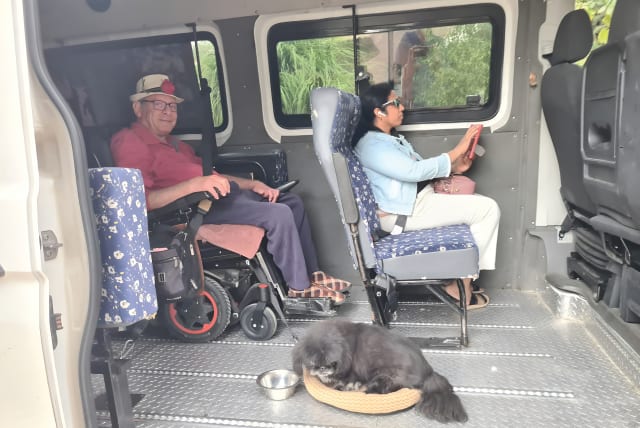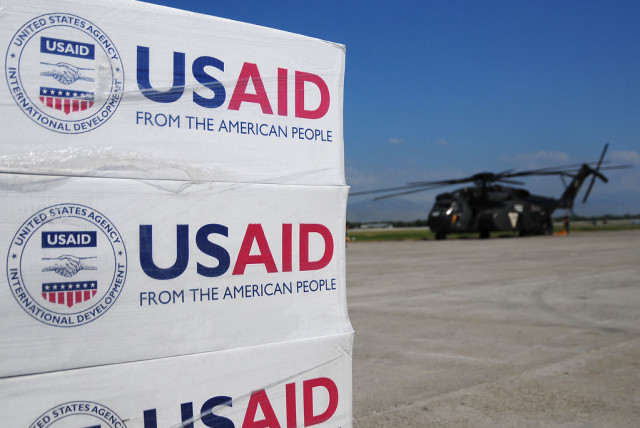For both Israelis and Palestinians, NGOs offer essential support during war

Non-profit organizations are providing meals, clothing, shelter, and other necessary items to displaced populations in both Israel and the Gaza Strip, helping to relieve some of the difficulties.
The Israel-Hamas war has resulted in displacement and disruption for people in both Israel and the Gaza Strip, and donations and NGOs are playing a crucial role in providing meals, clothing, shelter, and other necessary items during a chaotic time.
The Media Line reached out to two non-profit organizations, one in Israel and one in the Palestinian territories, to discuss how each is assisting its people.
The Ezrat Achim Medical Assistance Center, based in the Israeli town of Beit Shemesh, west of Jerusalem, provides medical equipment and assistance across the country.
Rivky Tyberg, the organization's director of donor relations, said that before the war, Ezrat Achim mainly assisted people in the Beit Shemesh area, which has no hospital. However, following Hamas' murderous rampage in Israel on Oct. 7 and the subsequent outbreak of the war, more than 200,000 Israelis from the northern and southern border areas were displaced from their homes to other parts of Israel, necessitating a shift in the organization's operational approach.
“As soon as the war began, we kind of mobilized all the volunteers and the whole network that we had already set up," she said. "We were able to be cooking and delivering 2,500 meals a day, which were for the families who were displaced by the war. We also opened a pop-up shop, which was free. They had really come with nothing, and especially as it started to turn wintry, even if they brought a bag with some clothing, they certainly didn't have winter clothing and coats and things.”

Tyberg said that the large-scale displacement has become a pressing issue. Many families who came to Beit Shemesh are from areas that suffer frequent rocket bombardments from the Gaza Strip, but they are not from the border areas that were officially ordered to evacuate, and therefore they are not eligible for hotel stays funded by the government. However, many of those families are from poor socioeconomic backgrounds and cannot afford to pay for extended stays in hotels. Donors sent the organization funds to help pay for such families.
“Ultimately, we also were able to get a donation from someone in America that enabled us to pay for short-term rentals for some of the families," Tyberg said. "We were calling all the real estate agents if there were any empty apartments and trying to find places for people to stay.”
Meanwhile, veteran American non-profit organization Anera (American Near East Refugee Aid) provides humanitarian and development aid to refugees in the West Bank and Gaza Strip, Jordan, and Lebanon.
Sandra Rasheed, the organization's country director for Palestine, told The Media Line that while Anera's operational approach has remained unchanged during the war, it has significantly intensified its efforts to aid civilians in Gaza.
“We started almost 55 years ago. It started in 1967 after the [Six-Day] war that left so many Palestinians displaced," Rasheed said. "It was created by Palestinian-Americans, Arab-Americans, people who are interested in social justice, who wanted to find a way to support the mass exodus of Palestinians out of Palestine. Prior to this war, we worked in education, focusing on early childhood development, shelter, food security, health, medical donations, and community infrastructure. All of that was put on hold.”
It is estimated that some 1.9 million Gazans, over 85% of the population, have been displaced in the current war, and the World Health Organization has reported an increase in diseases attributed to overcrowded conditions in the refuge areas.
“Since the response started, we have distributed more than 6 million meals to people who have been displaced. That includes food parcels, vegetable baskets, and hot meals," Rasheed said.
"We have facilitated 55 psychosocial sessions for children, so they have guided activities for play and stress relief. We have 55 shelters that we clean on a rotation basis. It's not just our team that is working. We've been able to mobilize a network of over about 450 volunteers, partners, farmers, vendors, and other partner organizations to support us in the work that we're doing.”
The formidable challenges
Both women acknowledge encountering formidable challenges in delivering assistance.
Tyberg said that urgent calls from displaced Israelis seeking assistance are repeatedly forced to end abruptly because of rocket alerts.
“I would say that the hardest part for all the people here in the organization and all the volunteers was really that point where we had just gotten hundreds of phone calls coming in from families who were desperate. They would suddenly tell us there was a warning siren and hang up," she said.
"We would wait by the phone fearing for their lives. Then they would call back, like, 20 minutes later and say, 'OK, everything's OK. So, listen, when could you come and get us out of here? We're desperate. We need a place to go.'”
In the Gaza Strip, one of the major challenges faced by many volunteers and workers is fear for their own lives.
“We try to provide the coordinates so that people, so Israel, knows that these are shelters for staff of an American organization working for the displaced," Rasheed said. "But our team have said time and time again that if we're going to die, we're going to die serving our people. We're going to die serving the people that need support.”
Rasheed said that fuel is crucial to the organization's ability to deliver food to Gazans.
“Our work is reliant on being able to deliver the food to people in shelters," she said. "Having our team go to these shelters and provide the interventions and fuel is more precious than gold right now, and it's one of the hardest things to attain. And without fuel, we can't operate.”
Tyberg said the war is exacting a heavy psychological and emotional toll on the Israeli population.
"There are just so many people who know people who've been affected terribly. And it's just this very heavy feeling that we all have that it's just inescapable, just hanging over everyone,” she said.
Rasheed called for a permanent cease-fire to end the conflict.
“I think what we're asking for is people to advocate for a permanent cease-fire. The situation is very critical. We need a permanent cease-fire. We need a solution," she said.
Lana Ikelan is a recent graduate of the Hebrew University of Jerusalem and an intern in The Media Line’s Press and Policy Student Program.
